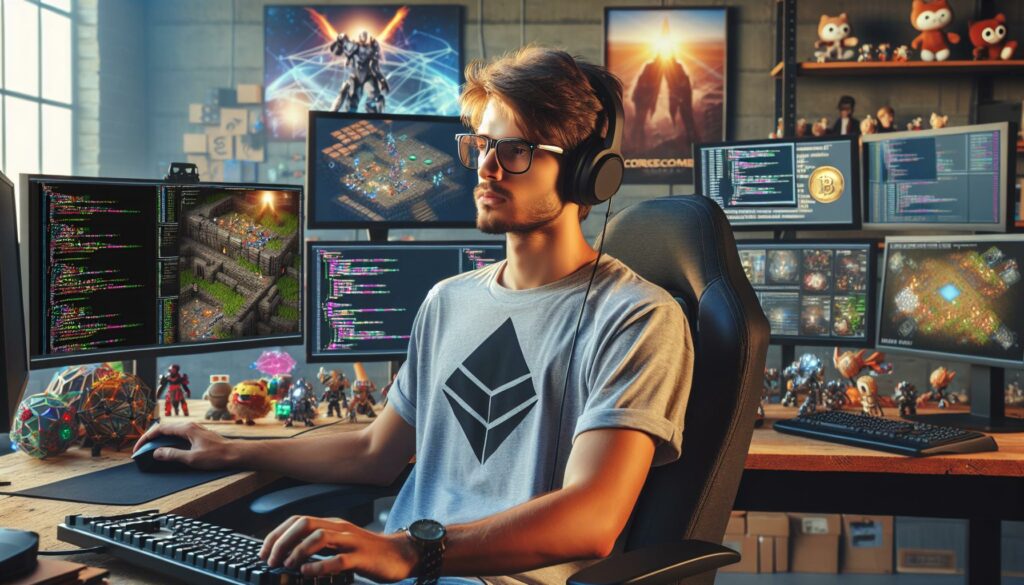As a blockchain gaming enthusiast I’ve watched the explosive growth of crypto-based games transform the gaming industry. Blockchain game developers are pioneering a new frontier where players truly own their in-game assets and can earn real value while playing.
I believe we’re witnessing a pivotal moment in gaming history as talented developers bridge the gap between traditional gaming and Web3 technology. By leveraging smart contracts NFTs and digital tokens these innovators are creating immersive experiences where players have unprecedented control over their virtual items. It’s fascinating to see how blockchain technology enables features like play-to-earn mechanics cross-game asset compatibility and decentralized marketplaces that were impossible just a few years ago.
Key Takeaways
- Blockchain game developers combine traditional game development skills with blockchain expertise to create decentralized gaming applications featuring digital assets and smart contracts
- Key technical skills include proficiency in programming languages like Solidity and JavaScript, smart contract development, Web3 integration, and understanding of NFT standards
- Essential development tools encompass environments like Truffle Suite, blockchain platforms like Ethereum and Polygon, game engines like Unity3D, and Web3 frameworks like Moralis
- Major challenges include technical complexity (gas optimization, scalability), economic volatility (token prices, player engagement), and security considerations requiring constant smart contract auditing
- Popular blockchain gaming platforms like Ethereum, BNB Chain, and Polygon offer specialized infrastructure with features like smart contracts, NFT standards, and marketplace integration
- Revenue models combine traditional gaming monetization with Web3 economics through play-to-earn mechanics, NFT integration, and token-based systems
Blockchain Game Developers
Blockchain game developers create decentralized gaming applications by combining traditional game development skills with blockchain technology expertise. These specialists build immersive gaming experiences that integrate digital assets, cryptocurrencies, and smart contracts.
Key Skills and Requirements
Blockchain game developers possess a unique combination of technical capabilities:
- Programming proficiency in Solidity, C++, JavaScript, Python or Unity
- Smart contract development expertise for platforms like Ethereum or Solana
- Experience with Web3 libraries including Web3.js or Ethers.js
- Understanding of cryptographic principles including public-key encryption
- Knowledge of consensus mechanisms like Proof of Work or Proof of Stake
- Game design fundamentals including mechanics, economics and user experience
- Familiarity with NFT standards such as ERC-721 or ERC-1155
Development Tools and Technologies
The essential tools blockchain game developers use include:
- Development environments
- Truffle Suite
- Hardhat
- Remix IDE
- Blockchain platforms
- Ethereum
- Binance Smart Chain
- Polygon
- Game engines
- Unity3D
- Unreal Engine
- Godot
- Web3 frameworks
- Moralis
- Alchemy
- ChainLink
- Testing tools
- Ganache
- Mocha
| Technology Category | Popular Tools | Use Case |
|---|---|---|
| Smart Contract Development | Truffle, Hardhat | Contract deployment and testing |
| Game Engines | Unity, Unreal | Creating game mechanics and graphics |
| Blockchain Networks | Ethereum, Polygon | Hosting decentralized applications |
| Web3 Integration | Moralis, Web3.js | Connecting games to blockchain |
Challenges Faced by Blockchain Game Developers
Blockchain game developers encounter specific obstacles that impact both development processes and game sustainability. These challenges require innovative solutions and strategic planning to create successful blockchain-based gaming experiences.
Technical Complexity
Building blockchain games demands expertise in multiple technical domains. Developers face challenges with:
- Smart contract optimization to reduce gas fees for transactions
- Cross-chain compatibility issues between different blockchain networks
- Scalability limitations affecting transaction speeds during peak gameplay
- Integration complexities between on-chain and off-chain game components
- Security vulnerabilities in smart contracts requiring constant auditing
- Performance bottlenecks due to blockchain transaction confirmation times
- Token price instability affecting in-game economy balance
- Player engagement fluctuations based on crypto market trends
- Development funding uncertainties during bear markets
- Asset valuation challenges for NFT-based game items
- Revenue stream unpredictability for play-to-earn models
- Investment risks in blockchain gaming infrastructure
| Market Impact Factor | Average Effect Duration | Risk Level |
|---|---|---|
| Token Price Swings | 1-3 months | High |
| Player Base Changes | 2-4 weeks | Medium |
| Development Costs | 6-12 months | High |
| NFT Floor Prices | 1-2 weeks | Medium-High |
Popular Blockchain Gaming Platforms
Blockchain gaming platforms provide developers with specialized infrastructure and tools to create decentralized games. These platforms combine robust development frameworks with gaming-specific features to streamline the creation of Web3 games.
Top Networks for Game Development
Popular blockchain networks for game development include:
- Ethereum: Hosts 75% of blockchain games through its ERC standards for NFTs tokens
- BNB Chain: Offers fast transactions high throughput at 30-45 TPS low fees
- Polygon: Provides Ethereum scaling solutions processing 7000+ gaming transactions per second
- Solana: Enables 65000 TPS with sub-second finality optimal for real-time gaming
- WAX: Specifically designed for gaming NFTs processing 8000+ transactions per second
| Network | Transaction Speed (TPS) | Avg. Transaction Fee |
|---|---|---|
| Ethereum | 15-30 | $2-50 |
| BNB Chain | 30-45 | $0.02-0.10 |
| Polygon | 7000+ | $0.0001-0.001 |
| Solana | 65000 | $0.00025 |
| WAX | 8000+ | $0.0001 |
Key development features include:
- Smart contract functionality for game logic implementation
- Native token standards for creating in-game assets
- Built-in marketplace infrastructure for NFT trading
- Cross-chain bridges for asset interoperability
- Development SDKs integration tools for rapid deployment
Each network provides unique advantages for specific types of blockchain games based on scalability requirements transaction costs player base preferences.
Revenue Models and Monetization
Blockchain game developers implement diverse revenue strategies that combine traditional gaming monetization with Web3 economics. These models leverage blockchain technology’s unique features to create sustainable income streams while providing value to players.
Play-to-Earn Mechanics
Play-to-earn mechanics enable players to earn cryptocurrency tokens through gameplay activities such as:
- Completing in-game quests or missions that reward native tokens
- Participating in player-versus-player battles with token-based prizes
- Staking in-game assets to generate passive income
- Trading resources gathered during gameplay on integrated marketplaces
- Contributing to game governance through token-based voting systems
The economic model typically includes:
| Component | Description | Impact |
|---|---|---|
| Token Distribution | 40% player rewards, 30% treasury, 30% development | Sustainable ecosystem |
| Daily Rewards Pool | 25,000-50,000 tokens | Player engagement |
| Staking APY | 12-25% annual yield | Long-term retention |
NFT Integration
NFT integration creates multiple revenue opportunities through:
- Primary sales of character NFTs with varying rarity levels
- Secondary market royalties from NFT trading (5-10% per transaction)
- Limited edition collectible releases tied to game events
- Upgradeable NFTs requiring token consumption
- Cross-game NFT compatibility enabling broader utility
| Metric | Average Value | Revenue Potential |
|---|---|---|
| Initial NFT Sale | $50-500 per item | High upfront revenue |
| Royalty Income | 7.5% per resale | Ongoing passive income |
| Upgrade Fees | $10-50 per level | Recurring revenue |
Best Practices for Blockchain Game Development
Implementing robust development practices ensures the creation of secure, engaging blockchain games that deliver value to players while maintaining technical integrity. These practices focus on essential aspects of blockchain game creation, from security protocols to user experience optimization.
Security Considerations
Smart contract security forms the foundation of blockchain game development through rigorous testing protocols and external audits. I implement these key security measures:
- Conduct comprehensive smart contract audits using tools like Mythril OpenZeppelin
- Deploy multi-signature wallets for administrative functions
- Implement rate limiting for token minting operations
- Use time-locks for critical contract updates
- Test contracts on testnets before mainnet deployment
- Monitor contract events with automated alerts
- Structure role-based access controls for administrative functions
User Experience Design
The user interface bridges Web2 gaming conventions with Web3 functionality through seamless wallet integration and intuitive transaction flows. I optimize these UX elements:
- Create clear onboarding tutorials for wallet setup
- Implement gasless transactions using meta-transactions
- Design intuitive interfaces for NFT minting mechanics
- Display real-time token balances in familiar formats
- Integrate progressive web app capabilities for mobile access
- Provide transaction status notifications with clear messaging
- Structure game mechanics around blockchain confirmation times
- Implement state channels for instant gameplay responses
I focus on minimizing friction points in blockchain interactions while maintaining transparency in all tokenized transactions. The interface presents complex Web3 operations through familiar gaming patterns that resonate with traditional players.
Future Opportunities in Blockchain Gaming
Emerging Game Genres
Blockchain gaming platforms demonstrate significant potential in new genres:
- Metaverse Ecosystems: Virtual worlds with integrated economies linking multiple games
- Social Gaming DAOs: Community-governed platforms featuring collective decision-making
- Hybrid Reality Games: Applications combining real-world activities with blockchain rewards
- AI-Enhanced RPGs: Role-playing experiences using AI for dynamic storyline generation
- Cross-Chain MMOs: Massive multiplayer games operating across multiple blockchain networks
Technical Innovations
Revolutionary developments transforming blockchain gaming:
| Innovation | Impact | Adoption Timeline |
|---|---|---|
| Layer 2 Solutions | 100x faster transactions | 2024-2025 |
| Zero-Knowledge Proofs | 90% reduced gas fees | 2024-2026 |
| Cross-Chain Bridges | 5x larger player base | 2024-2025 |
| AI Integration | 3x content generation | 2024-2027 |
Market Growth Projections
Blockchain gaming market demonstrates substantial growth potential:
| Metric | 2024 | 2025 | 2026 |
|---|---|---|---|
| Market Size (USD) | $5.8B | $12.5B | $25.2B |
| Active Users (M) | 25 | 45 | 80 |
| Game Releases | 850 | 1400 | 2200 |
Investment Landscape
Key investment areas in blockchain gaming development:
- Infrastructure Development: Layer 1 protocols connecting gaming ecosystems
- Development Tools: Advanced SDKs supporting multi-chain deployment
- Gaming Studios: Professional teams creating AAA blockchain titles
- Asset Marketplaces: Specialized platforms for gaming NFT trading
- eSports Integration: Tournament platforms with token-based rewards
Career Opportunities
Emerging roles in blockchain gaming:
- Tokenomics Designers: Creating sustainable in-game economies
- Smart Contract Auditors: Specializing in gaming contract security
- Blockchain Game Artists: Developing dynamic NFT artwork systems
- Community Managers: Managing player DAOs governance
- Cross-Chain Architects: Building interoperable gaming networks
- Zero-Knowledge Programming: Implementing privacy features
- Cross-Chain Development: Creating interoperable gaming assets
- AI Integration: Developing dynamic content generation systems
- Scalability Solutions: Implementing layer 2 optimization
- Security Protocols: Designing hack-resistant gaming systems
revolutionizing the gaming landscape
I’ve witnessed firsthand how blockchain game developers are revolutionizing the gaming landscape with innovative technologies and creative monetization models. The fusion of traditional gaming with blockchain technology isn’t just a trend – it’s shaping the future of interactive entertainment.
As Web3 gaming continues to evolve I’m excited to see developers push boundaries with new concepts like AI integration cross-chain compatibility and immersive metaverse experiences. The opportunities for both developers and players are boundless and I believe we’re just scratching the surface of what’s possible in this dynamic space.
Whether you’re a seasoned developer or just starting your journey the blockchain gaming industry offers incredible potential for growth innovation and success. The future of gaming is decentralized and it’s brighter than ever.



